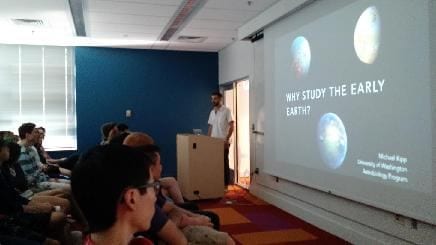
Ever since early humans first looked skyward and imagined the stars as distant campfires, humanity has wondered if we are alone in the Universe. The ancient Greeks argued against our home planet being the only cradle for life, but lacked the technology to prove their beliefs. In the late 20th century, the near-simultaneous discoveries of the possible remains of bacterial life in a Martian meteorite, and the first planets orbiting other stars, brought the question of the existence of life beyond the Earth to the forefront of scientific endeavor. In the 21st century, the new field of Astrobiology harnesses the required technological and scientific capability to seriously address this ancient and fundamental question.
Astrobiology is the study of life in the universe. The search for life beyond the Earth requires an understanding of life, and the nature of the environments that support it, as well as planetary, planetary system and stellar interactions and processes. To provide this understanding, astrobiology combines the knowledge and techniques from many fields, including astronomy, biology, chemistry, geology, atmospheric science, oceanography and aeronautical engineering. Astrobiologists can work alone on particular scientific questions, but often astrobiologists from different scientific disciplines work together to examine complex questions that no one field can answer alone. These questions cover topics such as:
- How does life originate?
- How does life evolve?
- What kind of environment is necessary for life to survive?
- What are the environmental limits or “extremes” under which life can survive?
- What might life look like on another world?
- Is there or has there been life elsewhere in our solar system?
- How can we observe and identify a habitable – or even inhabited – world?
- What is humanity’s future on Earth and beyond?
What Is Happening In The Field Of Astrobiology?
While astrobiology is a relatively young field, it has a secure and promising future. Astrobiology research has a significant impact on how agencies such as the National Aeronautics and Space Administration (NASA) and the European Space Agency plan for current and future space missions. For example, many recent missions have focused on exploring worlds in our own solar system for signs of past, present or the precursors of life, including Mars (Phoenix , Pathfinder , Global Surveyor, and others) and Titan (Cassini-Huygens). At the same time, significant advances and investments in telescope technology (Kepler, James Webb Space Telescope) have allowed researchers to begin planning and searching for habitable planets outside our solar system.
In the United States, NASA and the NASA Astrobiology Institute (NAI) are leading policy makers and funders in astrobiology. An overview of the research goals and objectives they have articulated can be found in the NASA Astrobiology Roadmap. Internationally, astrobiology networks and institutes have been established in Europe, Australia, Canada, Mexico and South America, including the Centro de Astrobiologia in Spain, the Nordic Network of Astrobiology Graduate Schools, and the Australian Center for Astrobiology.
The University Of Washington And Astrobiology
As the field of astrobiology has grown, there has been an increased need to train the next generation of astrobiology researchers and educators. This is why, in 1999, the University of Washington established its Astrobiology Program (UWAB) – an interdisciplinary education and research program dedicated to advancing our understanding of current astrobiology issues and training the astrobiologists of tomorrow. UWAB is home to many cutting edge research projects, an internationally recognized graduate program, and an ever-growing collection of teaching-and-learning resources for astrobiologists and astrobiology enthusiasts of all levels.
How Can I Learn More About Astrobiology?
Here at UWAB, our dedicated Education & Outreach team continues to develop a library of materials for audiences of all ages and experience levels, ranging from curious amateurs to university-level instructors and students.
If you are a student… visit our FOR STUDENTS page to find learning activities as well as information about the educational and career opportunities in astrobiology.
If you are an educator… visit our FOR TEACHERS page to access our collection of teaching resources, activities, and opportunities.
Or, if you are just plain curious… check out these resources for a user-friendly introduction to the field of astrobiology:
- NASA Astrobiology Institute
For the latest developments in NASA’s astrobiology research - Astrobiology Magazine
For the latest news and headlines in the field of astrobiology - Astrobiology Graphic Novels
Graphic novels that tell the story of our search for life in the universe - Podcasts: Beer with the Blue Marble Space Institute of Science(via iTunes)
An informal scientific conversation on a broad set of research topics undertaken by the Blue Marble Space Institute of Science. - Interact with the Living Universe
Games, quizzes, simulations, and other activities to educate and entertain! - Astrobiology Graphic Novels
Graphic novels that tell the story of our search for life in the universe - Podcasts: Beer with the Blue Marble Space Institute of Science(via iTunes)
An informal scientific conversation on a broad set of research topics undertaken by the Blue Marble Space Institute of Science. - Interact with the Living Universe
Games, quizzes, simulations, and other activities to educate and entertain! - Podcasts: Big Picture Science
Big Picture Science is a one-hour science program, produced at the SETI Institute’s radio studio in Mountain View, California, connecting ideas about the origins, the behavior, and the future of life – and technology – on Earth in surprising and playful ways. - Astrobiology 101
An introductory article from Ad Astra magazine - Microbial Life in Extreme Environments
An introduction to life in extreme environments - S.A.G.A.N. (Social Action for Grassroots Astrobiology Network)
A new social network whose mission is to promote the science of astrobiology by providing a lively communication platform where journalists, teachers, students, scientists, and members of the general public alike can share ideas and information - AstroVenture
Activities and resources focused on the search for habitable planets - Extreme Planet Makeover
Experiment with building your own habitable world!
